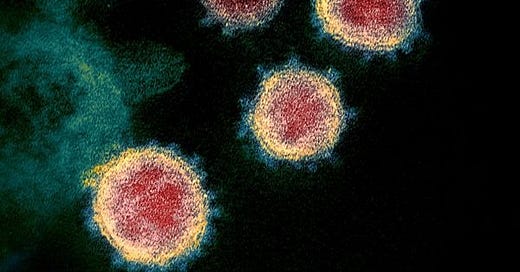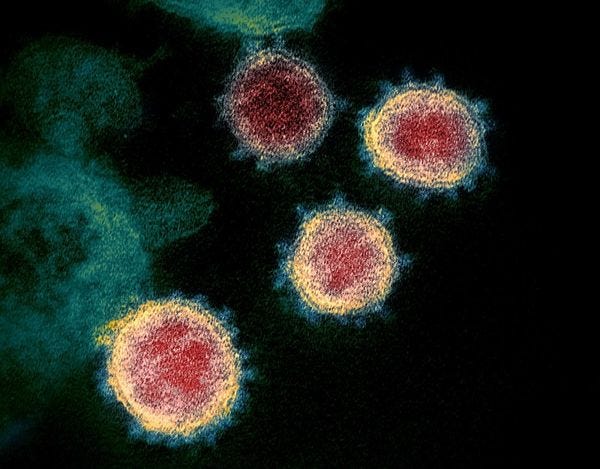
Be Like Texas (Or Bexar County At Least) And Stop Sending Minor Offenders To Coronavirus Jail!
States and counties have to take action now.
Around the country and the world, people are buying supplies and hunkering down in an attempt to slow the spread of COVID-19, which has now been declared a global pandemic. By now, most of us are familiar with the fact that older people and people who are already immunocompromised or otherwise sick are at greater risk of complications than others.
But there's one highly vulnerable population that is being widely overlooked: the incarcerated.
More than 10 million people are admitted to American jails every year. Another 731,000 people are held in local jails every day. In the last 30 years, the number of incarcerated people in our country has increased by 500 percent. And a lot of these people aren't guilty of any crimes.
On any given day in America, nearly half a million people who haven't been convicted of a crime are sitting in jail simply because they can't afford to post bail. These people are legally considered innocent of the crimes they're accused of. Sixty percent of incarcerated people in America fall into this category.
It's likely the coronavirus has already infiltrated many jails and prisons in the US. This weekend, a prisoner at Nassau County Correctional Center in East Meadow, New York, tested positive for COVID-19. He entered the jail on March 6 and became symptomatic on March 12. It's currently unknown how many others at the facility may be infected.
The situation is dire
Good healthcare behind bars is difficult to find anywhere in America, but oftentimes jails have a harder time providing adequate care than prisons. Jails are intended to house people for short periods of time and, by their nature, frequently don't have long-term strategies in place. Right now, the situation is even more serious than usual — we are in the midst of a pandemic that, as of Monday afternoon, has already resulted in more than 7,000 deaths worldwide. And people in dirty, overcrowded jails are at an even greater risk of contracting coronavirus, and of dying from it.
We need only look to countries that have already been hit by the coronavirus for the horror stories that are likely to become reality here, unless we take swift, drastic action. In Iran, quick spread among their incarcerated population prompted the country to temporarily release 70,000 prisoners. In South Korea, 101 — all but two — patients in the Daenam psychiatric ward contracted COVID-19. Seven of them have already died.
In American prisons and jails, there is no such thing as privacy or self-quarantine. People are forced to share cells, bathrooms, cafeterias, and recreational facilities. In prisons, there are often as many as four people to one cell, sharing the same toilet and sink. Our notoriously overcrowded jails are full of holding cells, with people brought in and out many times a day, usually without any real health screening.
Toilets usually don't have lids. The water from the toilet tank is also used for hygiene, washing hands, and brushing teeth. Prisoners may not even have access to soap, as most facilities require people to purchase hygiene items from an overpriced commissary. Hand sanitizer generally isn't allowed at all because of its alcohol content. Windows don't open. Large groups of people wait in line together, eat together, and shower together.
Every jail and prison in our country is a giant outbreak waiting to happen.
As one expert put it:
"We should recall that we have 5,000 jails and prisons full of people with high rates of health problems, and where health services are often inadequate and disconnected from the community systems directing the coronavirus response," said Dr. Homer Venters , former chief medical officer of the New York City jail system. "Coronavirus in these settings will dramatically increase the epidemic curve, not flatten it, and disproportionately for people of color."
Due to high turnover, jails are even more likely than prisons to be epicenters of coronavirus outbreaks. More than half of people in jail are only there for a few days, dramatically increasing the risk of a person bringing in an infectious disease like coronavirus.
The situation in our prisons and jails could get really bad, really fast.
But there are solutions
The good news is that there are concrete steps we can take right now to combat the spread of COVID-19 within our correctional institutions.
Some places are starting to take action. Bexar County, Texas, AKA San Antonio, has suspended arrests for minor offenses so their jails aren't overcrowded. Cuyahoga County jail in Ohio (Cleveland) released hundreds of prisoners. San Francisco is taking action to reduce its jail population.
But not everyone is showing this same compassion and concern. Other jurisdictions across the country have failed to release any kind of plan for how they intend to keep the people who in their care safe from this pandemic. In New York, Governor Andrew Cuomo has said he wants the legislature to amend New York's new bail reform laws when it comes back later this week — because apparently incarcerating more people during a global pandemic is that big of a priority for him. And at notoriously unsafe Riker's Island, thousands of prisoners have been instructed to sleep head to toe in their overcrowded cells. One need not be an epidemiologist to know that will do nothing to prevent the spread of disease.
We already know that people with underlying health conditions and older people are most susceptible to get seriously ill or die after contracting the new coronavirus. America's correctional institutions are full to the brim with people who fall into these risk categories. There are 274,000 people over age 50 in our prisons and far more in jail. Around 40 percent of prisoners already have chronic health conditions. And so on.
There are simple steps correctional institutions and law enforcement officials can take to reduce the risk of becoming petri dishes for a deadly virus.
A lot of people who are currently incarcerated don't need to be. Immediately stop arrests for minor offenses, including things like marijuana possession and non-violent crimes. Reclassify minor crimes so they require a citation, rather than jail time. Release people who can't afford bail on their own recognizance. Make use of ankle monitors for people who can serve their sentences under house arrest. Liberally use pardon and commutation powers to release low-risk prisoners, like the elderly . Postpone office visits for people on probation and parole.
We also need to see quick training of jail and prison employees in best practices for preventing transmission and combating spread. People brought into the population from incarceration need to be screened. Jails and prisons should be in touch with their state and county health officials, to ensure they're being factored into local plans for disease prevention. And, like everywhere else in the country, our jails and prisons are in desperate need of COVID-19 tests.
We have already passed a tipping point with coronavirus. It has spread around the country, including to our jails and prisons. Incarcerated people are some of the most vulnerable people in our society. They are completely at the mercy of the state. And the state has both the moral and constitutional responsibility to keep people in its custody safe from harm.
There are measures we can start taking today to save lives. If we don't, the results could be catastrophic.
Now is the time to take action, before it's too late.
Wonkette is independent and fully funded by readers like you. Click below to tip us! And if you're buying coronavirus supplies or other goodies on Amazon, click this link and we'll get a cut!












sure jan
https://twitter.com/alt_fda...
yeah
https://twitter.com/alt_fda...